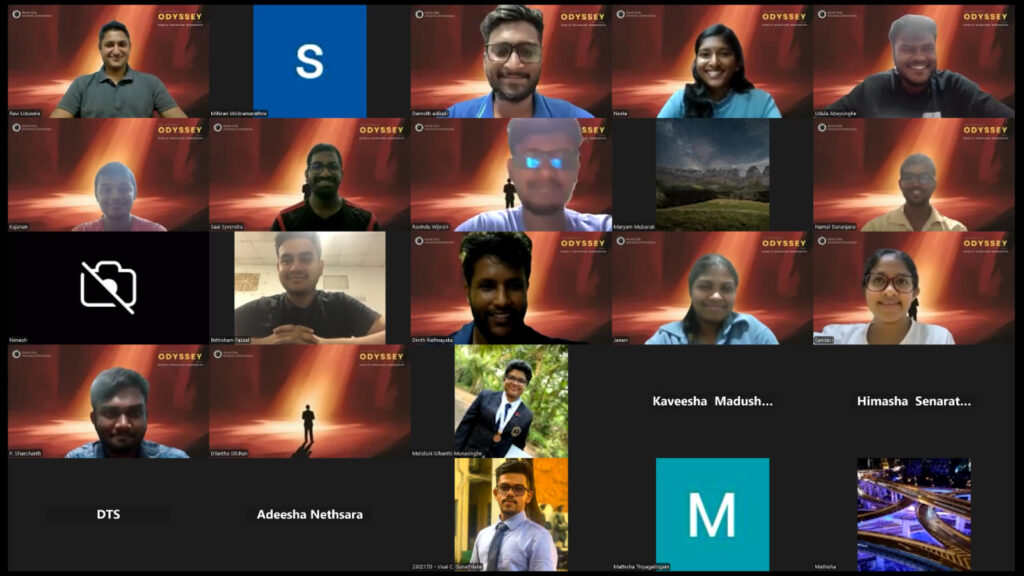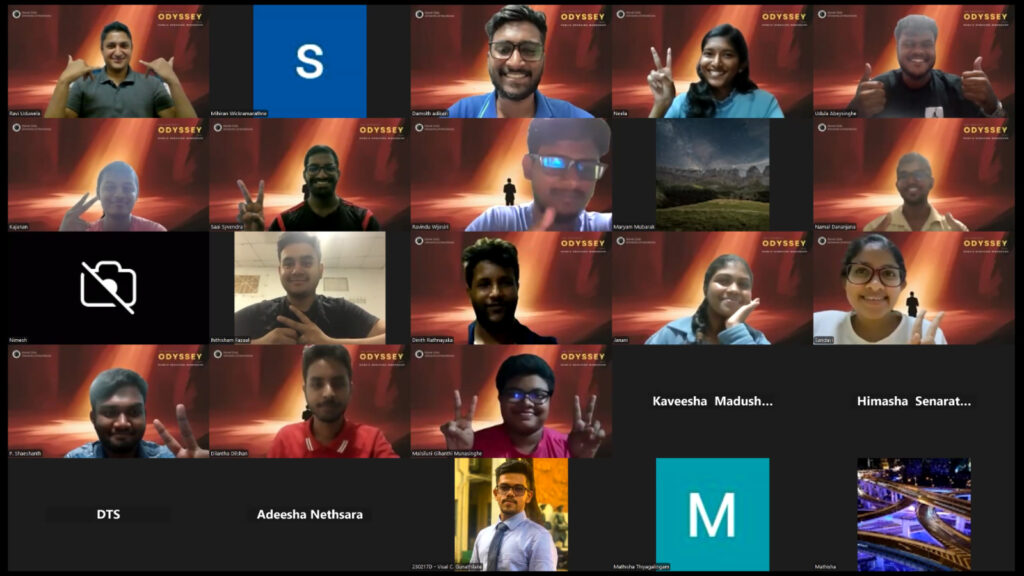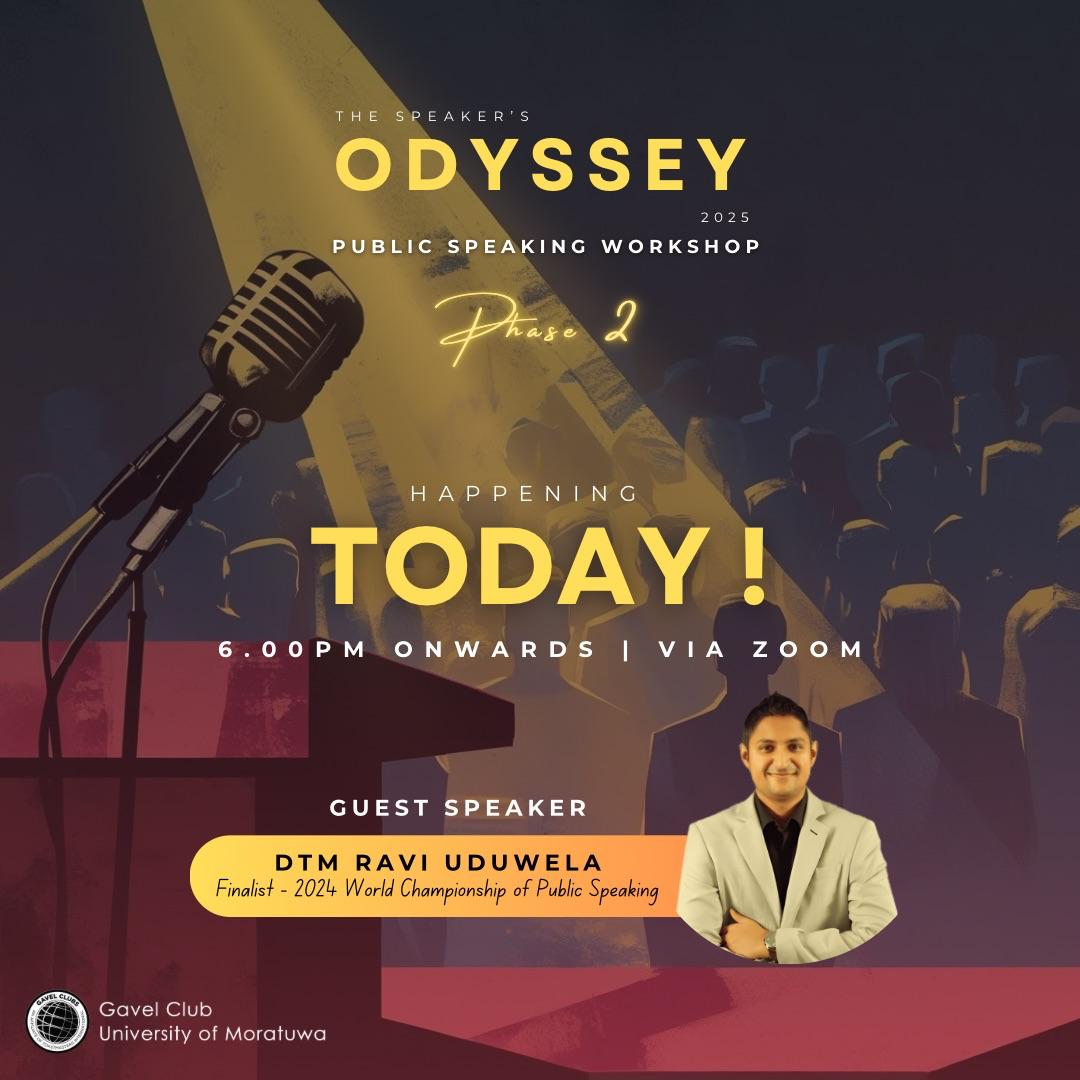By Namal Dananjana
The recent Speakers Odyssey workshop organized by the Gavel Club of the University of Moratuwa focused on enhancing public speaking skills, and featured keynote speaker Mr.Ravi Uduwela. The event commenced at 6 PM on the 12th of January and attracted participants eager to improve their oratory abilities.
Mr.Ravi Uduwela is an accomplished public speaker and a finalist at the 2024 World Championship of Public Speaking. His journey in Toastmasters began in 2015, and he has since earned the prestigious Distinguished Toastmaster status, reflecting his dedication to the craft of public speaking. Mr.Uduwela emphasized that every effective speech should encompass two crucial components: context and delivery.
- Context refers to the substance or message of the speech, ensuring it is relevant and meaningful to the audience.
- Delivery, on the other hand, is how the speaker conveys that message, making it engaging and memorable.

Mr.Uduwela delved deeper into one of the most critical aspects of delivery—body language. He explained that body language is a non-verbal tool that can significantly enhance or diminish the impact of a speech. He highlighted several key elements of body language.
Mr.Uduwela noted that body posture reflects our confidence and nervousness levels. He taught attendees about the best postures for delivering speeches, emphasizing that a strong, open posture conveys authority and assurance, while slouching can signal insecurity.
He also stressed that eye contact should be meaningful and intentional. Before starting a speech, speakers should focus on their audience to establish a connection. He highlighted the importance of balanced eye contact, encouraging speakers to engage different sections of the audience by using looks to position things or characters within their narrative. This approach not only maintains audience interest but also fosters a sense of involvement in the presentation.
Mr.Uduwela discussed common mistakes speakers make with hand gestures, such as fidgeting with jewelry or clothing, clasping hands, and finger-pointing. These behaviors can create barriers between the speaker and the audience, signaling that the speaker is not open or approachable. Instead, he encouraged participants to use purposeful gestures that complement their message. He elaborated on three types of effective hand gestures:
- Conventional Gestures: Widely recognized gestures that convey specific meanings, such as waving hello or pointing to indicate direction.
- Descriptive Hand Gestures: Gestures that illustrate what you are saying; for example, using your hands to show size or shape when describing an object.
- Emotional Hand Gestures: Gestures that express feelings; for instance, placing your hand over your heart when speaking about something deeply personal or important.
Mr.Uduwela highlighted the importance of matching emotions with facial expressions. He discussed common pitfalls such as monotonous facial expressions, which can make a speech feel flat and unengaging, and conflicting facial expressions, where a speaker’s face does not match their words, leading to confusion among listeners. He advised participants to avoid excessive hand movement if they want to give prominence to their facial expressions, allowing their emotions to shine through naturally.
Mr.Uduwela emphasized several important principles for effective body language:
- Body language should complement your words, reinforcing your message rather than contradicting it.
- It should be appropriate for the occasion; speakers should be mindful that they are not performing in a drama but rather communicating effectively with their audience.
Controlled movement on stage can help you command attention and create a dynamic presence, but excessive pacing should be avoided as it may appear nervous or unfocused.
After discussing body language, Mr.Uduwela shifted focus to another critical aspect of public speaking: voice modulation. He emphasized several key factors regarding voice. Uduwela stressed that a monotonous voice can disengage an audience quickly. Speakers should vary their tone to maintain interest and emphasize key points effectively. The pitch of one’s voice plays a crucial role in conveying emotions and intentions. Mr.Uduwela explained that varying pitch can help highlight important messages and keep listeners engaged.
The speed at which one speaks is equally important. A varied pace allows speakers to build suspense or emphasize critical points; slowing down can help underscore significant ideas while speeding up can convey excitement. Adjusting the volume is essential for ensuring all audience members can hear clearly while also adding emphasis where necessary. A louder voice can command attention, while a softer tone can draw listeners in for more intimate moments.
Mr Uduwela discussed how clarity and resonance contribute to overall voice quality. A clear voice enhances understanding while a resonant voice adds depth and richness to speech delivery. One of Mr. Uduwela’s key takeaways was the strategic use of pauses in speech delivery. Pauses can create anticipation, allow listeners to absorb information, and emphasize critical points without overwhelming them with constant dialogue.
To conclude the workshop, Mr. Ravi Uduwela held an interactive Q&A session where he addressed all doubts and queries from attendees. This segment allowed participants to seek clarification on various topics discussed during the workshop, providing them with personalized insights and practical advice tailored to their public speaking challenges.
The workshop was not just about theory; it was highly interactive, allowing participants to practice their skills in real time. Mr.Ravi encouraged attendees to incorporate these elements into their speeches and provided constructive feedback to help them refine their delivery techniques.
The Speakers Odyssey workshop was a resounding success, leaving participants inspired and equipped with practical tools to elevate their public speaking abilities. Mr. Ravi Uduwela’s emphasis on context, delivery, body language—including posture, meaningful eye contact, effective hand gestures (conventional, descriptive, emotional), appropriate facial expressions—and voice modulation (pitch, pace, volume) offered invaluable insights for aspiring speakers.
The Gavel Club of the University of Moratuwa continues to be a beacon for students passionate about honing their communication skills, providing opportunities like this to help them shine on any stage they step onto!


